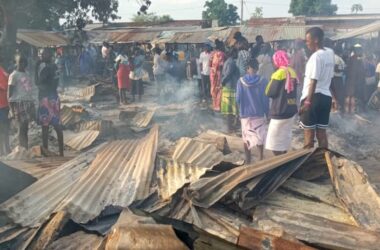By Bida Elly David
Central Equatoria State governor Emmanuel Adil Anthony has called for upholding and respect of Citizen’s rights as the country prepares for the general elections at the end of the transitional period.
Speaking during a one-day forum on human rights enhancement for the inclusion of stakeholders’ participation in the coming election, Adil stated that achieving human rights through the inclusive participation of all stakeholders will be challenging.
But he reiterated that the democratic demand for normal conduct of general elections may not be as strong due to its standard.
The governor acknowledged achieving human rights through inclusive participation in the next elections will be a challenging task.
“Respect for human rights is essential for the will of the people to be respected in election processes, besides, participation being human rights is in itself,’’ Adil said
“It is important to create an environment in which human rights are respected and enjoyed by all individuals in particular to equality and non-discrimination.”
He believes that while the upcoming election may not align with typical democratic principles, it serves as a better start.
“Conducting a normal house consensus for determining constituencies should have been one of the key factors credible for elections and inclusive in nature for stakeholders,” he added.
Adil noted numerous challenges to be addressed for the 2024 general elections.
“The prevalence of the socio-economic and political situation in the Country will not allow a conducive atmosphere for the conduct of elections to be the desired standard,” he said.
For her part, Zahra Said, a representative of the Civil Society Organization (CSO), stated that stakeholders will not be deprived in the upcoming elections.
“Each person has a right to make a decision at the right time and right choice as we are going towards election at the end of 2024,” she said
“All stakeholders are part and partial of election processes not forgetting human rights aspects and accountability being key pillars.”
Zahra emphasized the importance of an inclusive civic education election process that does not discriminate against stakeholders within the agreed agreement.
“It is diverse for the group recognizing not people within a group, people within the group are political parties and people recognizing others are not in parties,” she stated.
She noted that there are already human rights guiding principles for electoral inclusion.
“One of the principles is election has to be genuine, inclusive, respectful and should be based on engagement whether you are from party A, B or neutral,’’ Zahra said.
She said the government at any level has the mandate to dictate any democratic process towards elections noting that there should be a uniform drive.
“It is our right to vote independent candidates, there are large tribes and communities speaking different languages but there are others who are marginalized,” she added.
Zahra discouraged the marginalization of minority tribes noting that it is their time to come out and be represented.
She added that there should be freedom to conduct electoral campaigns by contestants whether by members from political parties or independent candidates.
“There should not be violence or hate speech because my right stands where your right ends,” she said.
Meanwhile, Dr. Musa Gassama UNMISS director of the human rights commission encourages the Central Equatoria Government to consider stakeholders’ inclusion in the election process crucial.
“South Sudan is a very young Country, but the people have very strong ideas, highly smart and intelligent, don’t treat them as children it is a mistake,” he said.
“These are people who shared blood for their independence, and we are here (UNMISS) to support, and we will do that.”
The forum was supported by the United Nations Mission in South Sudan.




